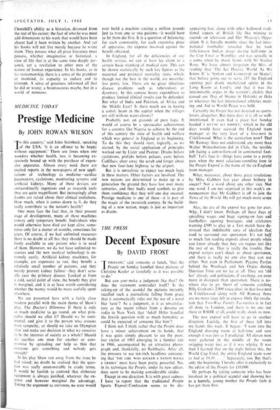Prestige Medicine
MEDICINE TODA Y
By JOHN ROWAN WILSON One must face the fact that, in their present stage of development, many of these machines convey only temporary benefit. Individuals who would otherwise have died are kept alive, some- times only for a matter of months, sometimes for years. Of course, if we had unlimited resources there is no doubt at all that they should be made freely available to any patient who is in need of them. However, we do not have unlimited re- sources and the new medical technology is ex- tremely costly. Artificial kidney machines, for example, are expensive to run, they benefit a relatively small number of patients, and they merely prevent kidney failure—they don't actu- ally cure the primary disease. Looked at from a cold, social point of view, the benefit they give is marginal, and it is at least worth considering whether the money would be more usefully spent elsewhere.
We are presented here with a fairly close modern parallel with the main theme of Shaw's play, The Doctor's Dilemma. If there is only so much medicine to go round, on what prin- ciples should we allot it? Should we be senti- mental, and give it to the person who arouses most sympathy, or should we take an Olympian view and make our decision in what we conceive to be the interests of society as a whole? Should we sacrifice one man for another or com- promise by spreading our help so thin that everyone gets something and nobody gets enough?
In his play Shaw ran away from the issue he had raised; no doubt he realised that the ques- tion was really unanswerable in crude terms. It would be foolish to contend that elaborate equipment is always justified, whatever the ex- pense and however marginal the advantage. Taking the argument to extremes, no state would ever build a machine costing a million pounds just to treat one or two patients—it would have to let them die first. It is a question of balancing, for each community, for each expensive piece of apparatus, the expense involved against the benefit obtained.
In England, for all the deficiencies of our health service, we can at least lay claim to a certain basic standard of medical care. This can be shown statistically by such key figures as the maternal and perinatal mortality rates, which, though not the best in the world, are neverthe- less pretty low. There are no great infectious disease problems such as tuberculosis or dysentery. In this context heavy expenditure to produce limited clinical results can be defended. But what of India and Pakistan, of Africa and the Middle East? Is there much use in having a cobalt beam in the capital when the villages are still without water-closets?
Probably not, on grounds of pure logic. It would of course be a spectacular achievement for a country like Nigeria to achieve by the end of this century the state of health and welfare which was general in England at its beginning. To do this they should start, logically, as we started, by the social application of principles worked out by Lister and Pasteur. Drains before cyclotrons, prefabs before palaces, carts before Cadillacs; clear away the scrub and forget about that new four-lane highway to the airport.
But it is unrealistic to expect too much logic in these matters. Other factors are involved. The new nations are determined to make up in a generation the ground they have lost over many centuries, and they badly need symbols to give them confidence that they will one day succeed. Prestige medicine is one of these—it is part of the magic of the twentieth century. In the build- ing of a new nation, magic is just as important as drains.






























 Previous page
Previous page